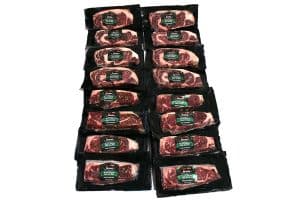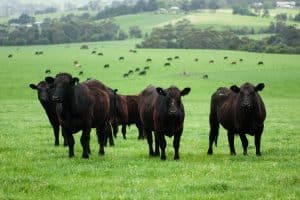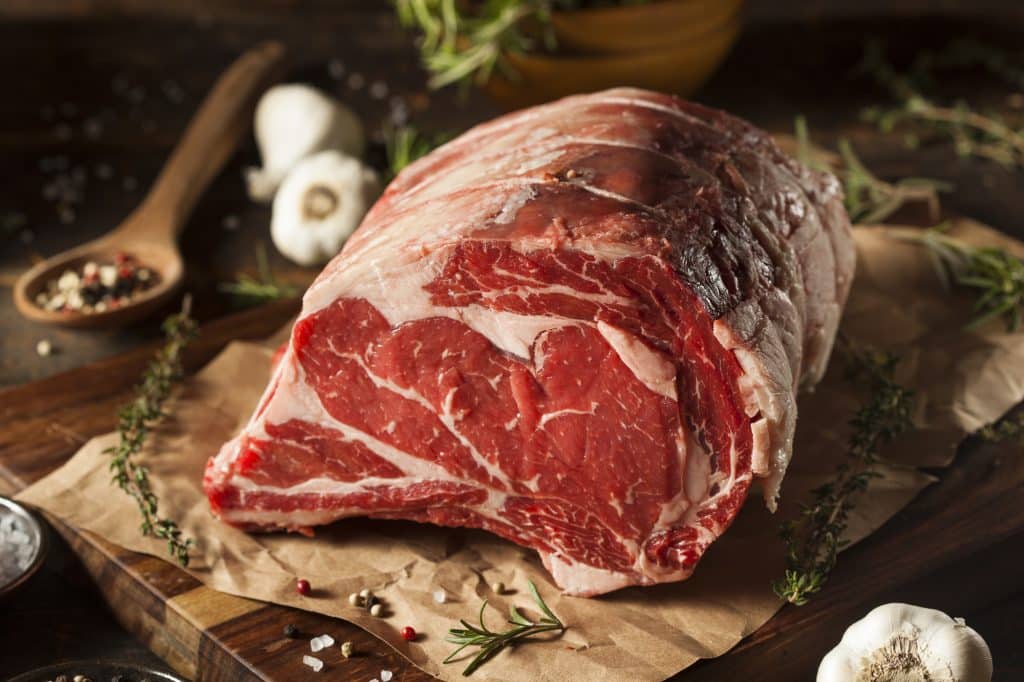In recent years, a significant question has been circulating among meat consumers and industry professionals alike – “Is grass-fed beef better?” Are you ready to cater to the growing demand for healthier, tastier, and ethically sourced meat options? 
At Red Top Farms, we think this query is not only relevant but essential in today’s food-conscious society. Especially, since we live in a time where the quality of what we eat has become as important as taste. With more consumers prioritizing health, animal welfare, and environmental sustainability, understanding the differences between meats is crucial for wholesale meat suppliers like us.
The debate of “Grass-Fed vs. Grain Fed” extends beyond just a simple marketing strategy. It encompasses multiple aspects such as nutritional value, environmental impact, animal welfare, taste, and economic considerations. As a wholesale meat supplier, it’s vital to grasp these nuances because they directly affect our business operations, product offerings, and customer satisfaction. Ultimately, the answer to the question helps shape the future of our industry and determines how we can best meet the evolving demands of our clients.
Understanding the Basics of Grass-Fed Livestock
Grass-fed livestock refers to animals that have been raised on a diet of natural grass and forage throughout their lifetime, starting from weaning. This method is also known as “pasture-raised” or “free-range.” Instead of being confined to feedlots, these animals roam freely in their natural environment, grazing on pasture. The grass-fed label can apply to various livestock, including cattle, sheep, and goats. It’s worth noting that the specifics of what constitutes “grass-fed” can vary, but in general, it implies that the animal’s primary food source is grass, rather than grain or other feeds.
Grass-fed ranching differs significantly from conventional ranching in its approach to animal rearing. Conventional ranching often involves raising animals in confined spaces or feedlots, where their diet consists mainly of grains, such as corn and soy, to fatten them up quickly. This method is designed for efficiency and high output. On the other hand, grass-fed ranching prioritizes the natural behavior of livestock. Animals graze on open pastures, and their growth rate is typically slower as they are not given hormones or supplements to speed up their development. This method is often associated with higher animal welfare standards and a more sustainable approach to ranching, as it can contribute to better soil health and biodiversity.
Nutritional Differences of Grass Fed Beef vs. Grain Fed Beef
There’s a growing body of research pointing towards notable differences in the nutritional profiles of grass-fed and conventionally raised meat. Grass-fed beef, for example, is often found to contain higher levels of certain nutrients compared to its grain-fed counterparts. Key among these are omega-3 fatty acids, which are beneficial for heart health, and vitamins such as vitamin E, A, and D. In terms of fatty acid composition, grass-fed beef tends to have a healthier fat profile, with less total fat and more heart-healthy fats like conjugated linoleic acid (CLA) and omega-3s.

The differences in nutritional profiles between pasture ranging and conventionally raised meat can be traced back to their diets. The grass and forage consumed by grass-fed livestock are rich in vitamins and omega-3 fatty acids, which then accumulate in the animals’ muscles, enriching the nutritional value of the meat. On the other hand, conventionally raised animals are typically fed a grain-based diet, which leads to a different fatty acid composition, generally higher in omega-6 fatty acids and lower in omega-3s. Additionally, the slower growth rate and more active lifestyle of grass-fed animals can also contribute to the leaner meat and favorable nutrient composition.
Taste and Quality
When it comes to the taste and quality of beef, both grass-fed and grain-fed varieties have their distinct characteristics that set them apart. According to culinary experts, grass-fed typically has a more pronounced, beefy flavor, with some describing it as having a slightly grassy or earthy note. The fat in grass-fed beef is often more yellow-colored due to the high beta-carotene content from the grass diet. It’s also leaner, with less marbling and fat compared to conventionally raised beef.
In contrast, grain-fed beef is known for its marbling, which contributes to its tenderness and juiciness. The flavor is often described as milder and more buttery, which many people associate with the classic steakhouse experience. Chefs and food connoisseurs often emphasize that the differences in taste and texture between grass-fed and grain-fed beef mean they might be suited to different cooking methods and recipes. For instance, the leaner profile of grass-fed beef may require careful cooking to avoid drying out, while the marbled grain-fed beef might be more forgiving and versatile. Ultimately, the choice may come down to individual preference for taste, texture, and nutritional profile.
Grass-Fed Beef Offers Advantages to Your Business
As a savvy restaurant owner or meat shop proprietor, you understand that your product offerings can significantly impact your business’ success. Embracing grass-fed beef can provide a competitive edge, allowing you to cater to discerning customers seeking healthier, ethically sourced, and tastier options. Here’s why you should consider it:
 Healthier Menu Options: By offering grass-fed beef, you’re providing a leaner, nutrient-rich alternative that’s high in Omega-3 fatty acids, antioxidants, and vitamin. This can attract health-conscious customers, boosting your reputation as a business that cares about wellness.
Healthier Menu Options: By offering grass-fed beef, you’re providing a leaner, nutrient-rich alternative that’s high in Omega-3 fatty acids, antioxidants, and vitamin. This can attract health-conscious customers, boosting your reputation as a business that cares about wellness.- Ethical Sourcing: Demonstrating your commitment to animal welfare and sustainable farming practices can resonate with today’s conscious consumers, enhancing your brand image.
- Superior Taste: Grass-fed beef is often praised by gourmets for its distinct, robust flavor, which can be a unique selling point for your culinary creations.
- Premium Pricing: Higher production costs allow for a higher retail price. Customers often perceive this as an indicator of superior quality and are willing to pay more for it.
- Increased Customer Satisfaction: Serving grass-fed beef can significantly enhance your customers’ dining experience, leading to positive reviews and testimonials, repeat business, and word-of-mouth referrals.
- Distinct Market Positioning: Offering grass-fed beef can help differentiate your business in a crowded market, positioning you as a premium, health-conscious, and ethical choice for consumers.
Remember, transforming your menu isn’t just about offering a new product – it’s about delivering an enriching culinary experience that aligns with your customers’ values and expectations. Are you ready to take your business to the next level?
Your Business Will Stand Out With Grass-Fed Beef
In today’s fiercely competitive business landscape, standing out from the crowd is not just an advantage – it’s a necessity. As a small business owner, you’re not just selling products or services; you’re selling an experience, a story, and a commitment to quality and ethical sourcing. By embracing grass-fed beef, you are making a powerful statement about your business’s values, elevating your brand, and enhancing your customer’s experience.
So, are you ready to take your business to new heights? Remember, the choice you make today can shape your business’s future. So, make the decision that positions your business as a leader, not a follower. Take the leap today, and see the transformative impact on your business tomorrow. It’s time to let your actions show your commitment to quality, sustainability, and customer satisfaction. Make the choice because your customers deserve nothing but the best!
It’s time to Choose grass-fed beef.
Call Red Top Farms Today at: (816) 628-0078
